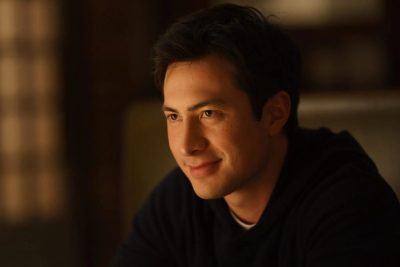BY NOAH BERLATSKY
In a scene from the newly released The Accountant 2 that made the film’s trailer, Brax (Jon Bernthal) asks his autistic brother Christian (Ben Affleck) why, even after they’ve been apart for 8 years, Christian seems so emotionally distant.
“Do you not miss me because of me?” tough guy Brax asks with a quaver in his voice. “Or is it your condition?”
Christian refuses to take either option though. “I’m just me,” he says.
Christian’s response doesn’t just refute Brax’s assumption; it refutes the assumption of a lot of autism representation. Ever since the release of the sweepingly influential Rain Man in 1988, autistic characters in mainstream film have tended to be defined by a particular, narrow vision of autism. The Accountant (2016) and its sequel, even more emphatically, try to give Christian an individuality and identity that reflects a broader understanding of autistic people’s uniqueness and difference, not just from neurotypicals, but from each other.
The effort is appreciated. But it’s not entirely successful, both because Rain Man hovers in the background and because for action thrillers especially, the idea of the autistic savant is too convenient to give up. You can see the same problems in a range of other action films — and you can see, perhaps, how to avoid those difficulties in Kimi, a film that provides a more nuanced take on autism in part by not intending to address autism at all.
Autistic people are not always what you expect — and if we want to see that reflected in film, we may need to look in some places where Hollywood doesn’t expect us.
Rain Man Just Won’t Stop
Rain Man — as Steve Silberman discusses in his groundbreaking history of autism, Neurotribes — was the first major film to include an adult identified as autistic. As such, it had a huge role in making autistic people visible to doctors, to families, to the public, and to themselves. Yet,
for all the good it did, Rain Man’s representation of autistic people is extremely flawed. Raymond, the autistic man played by Dustin Hoffman, was based on a number of people, some of whom were autistic, some of whom were savant, and none of whom were institutionalized
In fact, Silberman comments, “It’s highly unlikely that any of [Hoffman’s models] would have developed their impressive skills and abilities” if they had been living in a full-time care facility rather than independently.
Despite the evidence of the film’s own development process, however, director Barry Levinson and Hoffman chose to present autism as a condition characterized by extreme deprivation and extreme abilities; Raymond cannot live outside an institution. Although only an estimated 10% of people with autism possess savant skills, Raymond’s savant abilities and his autism are as Hoffman portrays them inseparable. For example, Raymond’s refusal to fly in an airplane appears to be a result of the fact that he has memorized and can instantly recall the date, casualties, and details of every airplane crash in history. He has internalized what is served for dinner at the home every day, and when television shows come on, and the address and location of the Kmart where he buys his underwear. His amazing memory is a gift, but has also trapped him in an endless loop of the past.
This was a fun character for Hoffman to play. But, again, it is not an accurate portrayal of autistic people — including the ones Hoffman based his performance on. That performance, though, was so influential, that it became the standard vision of what autism is in most mainstream big-budget films.
The Cube (1997), a Canadian science fiction film, includes a Raymond-like character who is defined by his inability to communicate and his ability to do complex factorization in his head. Mercury Rising (1998), features Bruce Willis trying to save a shy, thin young boy who is even less able to communicate than Raymond, and who has even more miraculous mathematical prowess. The Predator (2018) includes a young boy who does live at home, but whose mathematical abilities are so advanced that he instantly is able to master the weaponry of an alien race; the aliens in fact recognize autism as the next step in human evolution.
The Accountant Is Different… Sort Of
The Accountant and its sequel are definitely influenced by Raymond and by Rain Man. Christian, the hero, is, again, a savant — his wizardry with numbers has led him to a job as the accountant of last resort for criminal cartels trying to track down problems in their own financial empires. His amazing memory and powers of concentration also (thanks to his military father’s training) turned him into an unstoppable killing machine and assassin — a somewhat disturbing twist, given the post-Columbine stereotypes (falsely) linking autistic people to the perpetration of gun violence.
The film, though, also tries to engage with and adjust to the more nuanced public understanding of autism that has developed in the 37-odd years since Rain Man was released. Christian is very able to live on his own, and he’s gotten better control of his stimming as he’s grown up, as many autistic adults (like, say, me) do.
Christian is also not relentlessly infantilized. He is interested in dating, and while as a computer genius he seems oddly oblivious about forums for autistic people to meet each other, he does successfully get a woman’s number at a country bar — in part by using his super-memorization powers to instantly teach himself the hoe-down steps.
Those are all welcome (hoe-down) steps forward. And yet, this view of the autistic experience is still limited by the Rain Man formula.
Christian’s secret weapon is a group home full of autistic savants, all of whom are, like him, mathematical and computer wizards. It doesn’t seem to occur to anyone that an autistic person’s special interests might be country music rather than computers (also like, say, me). Nor do we ever see an autistic person who is not a savant — which is actually more representative of 90% of people with autism.
The Autism Action Movie You Don’t See
Rain Man was in part so popular because the autism savant is a fun pulpy trope; it’s a good gimmick, and there’s nothing Hollywood loves quite like a good gimmick. Television shows like Love on the Spectrum or smaller films like Please Stand By (2017) reflect a broader range of autistic experience. But big-budget Hollywood still finds Dustin Hoffman hard to put down.
So what might a pulpy Hollywood autism film look like if it abandoned Raymond? You can maybe see one possibility, I think, in Steven Soderbergh’s 2022 film Kimi.
The main character, in Kimi, Angela (Zoë Kravitz) is not identified as being on the spectrum. But she has a lot of tells. She’s got a serious anxiety disorder and is afraid to leave the familiar confines of her apartment. She’s blunt and abrasive in social interactions — most notably when negotiating sex with her boyfriend, Terry (Byron Bowers.) She is a stickler for rules and for quiet (much to the frustration of the guys trying to do renovation work in the apartment overhead). She is obsessive about controlling her space; immediately after sex, before Terry can even get up, she strips the bed and rushes the sheets to the washing machine. And she has an unwavering, fierce sense of justice, which drives the plot when she discovers that her employer (makers of Kimi, an Alexa-like computer program) is maybe covering up a murder.
Angela is detail-oriented, hyper-focused, and thinks on her feet. But she isn’t a savant. And although she faces serious challenges in social situations, she’s not a stereotypical nerd and her limitations very much do not look like Raymond’s
She’s abrasive and weird, but also appealingly herself, whether she’s engaged in doggy-style sex (because she doesn’t want to look at her boyfriend’s face?) or cold-bloodedly offing the bad guys. When Christian says, “I’m just me,” it’s not really true, inasmuch as he is in large part still Raymond. Angela, though, really is unique — neither the usual neurotypical strong female hero, nor the usual collection of autistic savant Hollywood tropes.
Kimi is not billed as an autism film — which is part of why it’s able to escape Rain Man in a way Hollywood autism films often can’t, or won’t. It isn’t trying to fit Angela into a specific, recognizable vision of what autism is.
It doesn’t want — or need — to ask Brax whether the person in front of you is a person or a diagnosis. Angela is herself, with a range of traits which are sometimes weaknesses, sometimes strengths, but which don’t have to be summed up in a label.
It’s important to raise awareness of autism in film, as Rain Man did, and as The Accountant 2 may, to some degree. But there’s also a danger in letting Hollywood define us, since Hollywood tends to define most things in whatever way best benefits its bottom line.
In that sense, the best autistic rep is sometimes the rep who is, like Angela, defined by traits that neurotypical Hollywood didn’t quite mean, and can’t quite see.
But we can, though.
Bio: Noah Berlatsky (he/him) is a freelance writer, critic, and sometime poet in Chicago. His most recent poetry collection is Gnarly Thumbs from Anxiety Press; his newsletter is Everything Is Horrible.
Follow Motley Bloom








